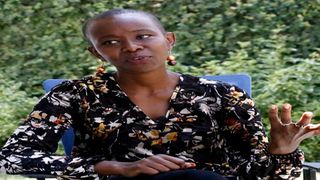
Hellen Njeri Mwangi, wife of activist Boniface Mwangi during the interview at Pawa 254 offices in Kileleshwa on November 24, 2021.
| Francis Nderitu | Nation Media GroupNews
Premium
Hellen Njeri on fleeing to exile after Weston saga and Boniface Mwangi’s love
Hellen Njeri Mwangi, wife of politician Boniface Mwangi, has been in the thick of death threats, intimidation and a stint in exile after an expose on Deputy President William Ruto due to the couple’s activism.
The mother of three also delves into the life of activism, the famous 2009 Jamhuri Day drama at Nyayo National Stadium and how she met Boniface.
Who is Njeri Mwangi?
I was born Hellen Njeri to Robert Kang’ethe and Mary Wanjiru from Murang’a in Nairobi 40 years ago, the third-born in a family of four children. I went to Utawala Academy, then known as Administration Police Training College Primary School before joining Naivasha Girls then Daystar University for a degree in communication and public relations.
I grew up in a strict, well-to-do Christian family. I went to boarding school at the tender age of eight, which I struggled with. I was also a worship leader.
How did you meet Boniface Mwangi, your husband?
It was in 2006. I still remember it like it was yesterday. It was on a Sunday after leaving Mavuno Church in Nairobi. I went with a group of friends to Steers along Wabera Street to have some ice cream. Then a guy comes in with a helmet in his hand and a leather jacket, walked past our table then spoke to a guy in front of us in a hushed voice. He reminded me of a star in a programme called Renegade, which I loved. He was a cop, good at his work where he committed the ultimate crime. He had a ponytail and used to ride a motorbike. Boni reminded me of that actor with his helmet.
I watched him from the corner of my eye and to be frank, everything disappeared from that moment on. I don’t remember what we were even talking about. I don’t remember what I said after he came in.
I don’t remember if our eyes locked, I just remember thinking, I would really, really like to meet this guy. It was like that character in the movie had just come out of the movie then went back. He left after a short while.
The guy he talked to came to me and told me he asked for my number as he is a photographer working for Pulse magazine and is looking for a model to photograph.
I was like what does that have to do with me yet I am not model material? But I was like give him my number and let him call me. He did not call me for like a month.
When he finally found an excuse, a reason to call me, he called and told me he was looking for someone to take a photo of for Pulse magazine.
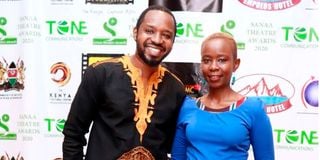
Boniface and Njeri Mwangi pose for a photo during the 2020 Sanaa Theatre Awards gala at the Kenya National Theatre.
I asked him how much he was paying but he said they don’t pay for such. So I told him since you have a bike you don’t have to pay, but I want a ride. If you give me a ride, then we will have the shoot. It was a deal.
He gave me a ride to Junction along Ngong Road all the way from Buruburu where we lived. I screamed all the way in excitement.
He took me back home at 10pm. I told him we would talk later since it was already late, but we found ourselves talking until 2am just outside our gate.
He told me about his life, growing up, spending time in the streets and that he wanted to be a leader in this country so that he can help the youth to not live the way he had.
His life was like a storybook; it was something I had never imagined having come from a privileged family. We were not rich, but I grew up privileged. So when he told me all these things, I was like completely blown away.
At that point I knew we could not have a relationship because he was on the fast lane, focused and knew what he wanted in life, yet here I am just going round and round like I am chasing my own tail. I knew we were not compatible.
But I completely admired him. I wished him all the best and told him that when he makes it and is looking at the crowd, let him not forget a chick he once met who is rooting for him.
Did he eventually take the photo he wanted?
Yes he did. My dad saw it and said in Kikuyu, “there is something that will come out of this”. I’m not sure what he meant. Maybe it was a blessing in disguise. He was blessing me because then we started dating.
Did Boni make his move?
Not really. He did not have to struggle because I was already smitten. I just went all in as I was taken in completely, sema kumezwa (laughs)... I met Boni when still a virgin at 26 years. The first time we became intimate, he broke my virginity and I got pregnant with our first son Nate.
I had planned my life, that I would start dating at 29 then maybe get a child at 31, but here I was already pregnant and not even married. We kind of fell out after that. I completely locked him out of my life. I was like this guy has ruined my life; you would think I was raped.
This is where effort came into play. He persisted, and that is why I am still with him. He is a real guy and even though he has his faults, he is very consistent. He is also a man of his word.
He told me he was going to be there for me and the baby whether I wanted it or not. He would visit me at the office, send flowers, cakes and come home to visit even though I did not want to see him. He was consistent.
How long did this last?
Five months. He came to my parents and told them he was the father of my baby and he will take responsibility. He said he is not going anywhere and that they’re going to be seeing him around.
I respected him for that. I was like, okay, this guy is here, if it were any other guy, he would have taken the chance and fled. It made me respect him a whole deal.
Nate was born and Boni said he wanted to marry me. But I asked him if he wanted to marry me just because we had a baby together – he said he wanted us both. He also told me he grew up without a father and he would not wish that for his child. I was like, okay. He was a decent guy and my family already liked him.
We didn’t move in together. I insisted we would only move in together after we are married. So I didn’t move out of home until we got married.
We got married exactly a week after the signing of the peace treaty following the 2007/2008 post-election violence.
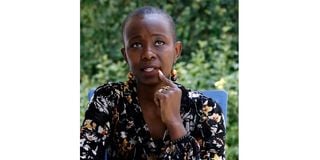
Hellen Njeri Mwangi, wife of activist Boniface Mwangi during the interview at Pawa 254 offices in Kileleshwa on November 24, 2021.
He was busy taking photos of the violence and we were not even sure the wedding would take place. The country was at war and there were times I didn’t think he was going to come home.
We’re on the phone, then there’s a shootout, then silence and then the phone goes off. Then I call him again, no answer. The phone is dead then in the news you hear a journalist has been killed. It was a very difficult time. But we got married at Club Sailing along Lang’ata Road on March 8, 2008.
What is Boni like at home?
At home he is just my pal. He is not fighting in the house like outside where he is fighting injustices and all that. That does not exist in our house.
He is totally different. He is that loving father and husband. He loves cooking nyama because that is his favourite meal.
How was it like living with Boni as he battled post-traumatic stress disorder after the 2007/08 violence?
It was the worst time of my life, because like him, I did not know he was going through PTSD. We fought even over the smallest of things. He was easily irritable though he had never taken even a sip of alcohol or smoked.
The year was really difficult for both of us, for him especially because he was struggling with the nightmares and the killings and the people that he saw dead. He visited morgues, he was at the famous Kiambaa Church and so all those images, the sound, the smells, the noises, all those things were really disturbing him.
So because all those things were eating him inside, we really struggled. I remember wanting to go back home enough times.
Thereafter...
We did Picha Mtaani, a street exhibition of the post-election violence in 2010, going across the country in pretty much the hotspots of the violence.
This was to give people all over the country a safe space to cry and open up. So people came to that exhibition, they talked about what happened to them. They talked about what they did. They talked about the injustices. They made pledges that they would never allow something like this to happen again.
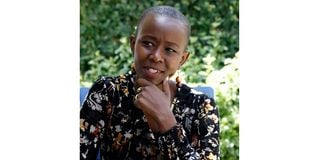
Hellen Njeri Mwangi, wife of activist Boniface Mwangi during the interview at Pawa 254 offices in Kileleshwa on November 24, 2021.
This proved somehow cathartic. However, it would have probably helped if we went for counselling, but it kind of checked itself. So we imagined what if we started a place where we use art for this kind of change?
What is your memory of the Jamhuri Day incident in 2009 when Boniface Mwangi booed President Kibaki?
Actually we had planned a silent protest for many months. We used to have the meetings every Tuesday in our house. We talked about disrupting the celebrations to call the government’s attention to social ills in the country.
The 12 of us would go to Nyayo Stadium and have different people stand in different pews then walk out in unison immediately President Mwai Kibaki stood up to speak. It was to be a silent protest.
Then what happened?
The stadium was packed and I remember watching the TV on the floor and I saw a person being roughed up and I wondered if the guy would survive. I remember saying to myself “Si huyo amefinywa sana”. It didn’t occur to me that the guy was in fact my husband.
Shortly, after I got a call that the guy who was arrested at Nyayo was Boni. My mother and sisters came home. I remember Caroline Mutoko and Paul Muite called me to tell me not to worry they will look for my husband.
He was later found in Industrial Area before being moved to Lang’ata Police Station. They then took him to hospital as he was badly beaten. I talked to him on the phone and he told me he was not that much hurt and he would spend the night at the police station.
When he came back, we did not really talk about the incident as we had just lost a baby. We were just glad that we were both alive.
After the near-death experience, did you then say this is it, I am not doing this activism thing anymore?
No. We had made the choice. I had chosen Boni with everything he came with. I will only tell him that sometimes we need to change tact. But he is never easy to change so we have always fought over this.
Is there a time when you wanted to stop?
That was in 2016 when Boni had a tiff with Deputy President William Ruto after we led demonstrations over the grabbing of the Lang’ata Primary School playfield by Weston Hotel, which is associated with him. The DP’s people were not happy; going home, we always had to look over our shoulders.
I am driving and thinking “what if someone on a motorbike just shoots thinking it is Boni in the car?” Many questions. It became difficult to even just take a walk. So you start becoming afraid not just for yourself but for the children too because whatever will happen to me or him will affect our children.
It became too much and I said I cannot stay in a space where I’m looking over my shoulders every time and my children could not go out to play because they might just be kidnapped.
So we left the country only to come back when the 2017 elections were around the corner.
What were the threats like? Were they verbal or physical?
During the launch of Boni’s book in November, 2016, someone walked up to me and gave me a letter. But even before that, Boni always had that gut feeling about something going wrong and asked for security during the launch.
The fact that somebody walked up to me and gave me that letter, we don't know whether that is the way it would have been done.
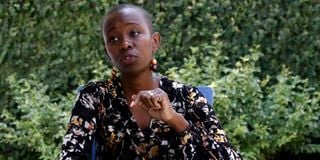
Hellen Njeri Mwangi, wife of activist Boniface Mwangi during the interview at Pawa 254 offices in Kileleshwa on November 24, 2021.
It was a very long letter but it said there was a plan to harm me or the kids because Boni had messed with the DP’s reputation. It detailed the things that could happen. But I never experienced anything directly.
How did PAWA254 come into being?
After the successful Picha Mtaani initiative, we thought of opening a place where photographers and different artistes could come and do exhibitions, we can shoot for fun for a change and all that. We can also equip people with photography skill. So then we opened PAWA254 in 2011.
We built the place and we got a lot of interest from all kind of artistes. Because of Boni’s profile, it grew fast.
It was a space where artists could come to network, work together and you know, do stuff together. But then it became this big thing.
People came to us to support the initiative and we began receiving donor funding to provide that platform for emerging talents.
We needed money because corporates wanted to work with us but could not because of fear of backlash.
They did not want to be identified with us even though they applaud Boni’s work in other platforms.
It was that situation of “we want to work with you but we don’t want to be seen working with you”. Fast forward – Boni leaves the organisation because he’s running for office as Starehe MP.
How did that affect the organisation?
People still think that Boni is PAWA and PAWA is Boni. So when he leaves, people feel PAWA is not what it used to be. They want him in, but at the same they don’t want him. It is a catch-22 situation. Donor priorities also started shifting and so is the support we used to get.
Do you see any of your children taking after you guys?
Yes, but maybe not in the way that we do. But yes, I do. Probably all of them but more so my daughter because she’s very feisty. She can be very forceful when she has a point to make and it has landed her in trouble time and again in school.
Your love for biking, how did it start?
It was fuelled by the Renegade movie and then the ride with Boni took it a notch higher. Nowadays, I just enjoy riding myself.
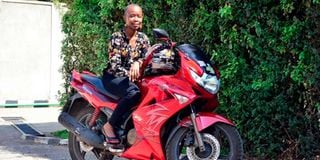
Hellen Njeri Mwangi, wife to activist Bonface Mwangi poses for a photo on her motorbike during the interview with the Saturday Nation at Pawa 254 in Kileleshwa on November 24, 2021.
How did you become a road safety ambassador?
We have lost many friends on the road but when we lost a very close friend called James Quest in 2016, I said I have to do something.
The undercover expose?
I am a journalist in another life. I am doing freelance work with BBC and the story about stealing babies was because a friend of mine narrated to me how many women in Nairobi have lost their children in hospitals, so I decided to investigate it.
We did not anticipate what we found out. The social workers at Mama Lucy Kibaki Hospital charged with the responsibility of taking care of these children were actually taking advantage and selling those children.
The story got an Emmy nomination and Amadi Prize for prestigious journalism around the world. It was also nominated for the Rory Peck Award.
I am working on another piece with BBC which has been delayed a bit but hopefully by the beginning of 2022 we should be able to put it together.
Were you misquoted in the “don’t identify us with our husbands” story that trended on social media?
What I said was that we don’t want to just be identified by our husbands’ name because we also have names. It is not that we don’t love our husbands, but just call me by my name.
We are very proud to be associated with our husbands and if we weren't, we would not be with them.
Even if the person is prominent hence the prominence value but don’t ignore the invisible work we do to have him there. By the time you’re identifying that man, you don’t know the struggles and tribulations that man has been through, that we as a family have been through.
Any future political ambitions?
I do not have those ambitions for two reasons. One, the way politics is in this country, it is such a tedious job.
Then, we have children, and that is why I don’t even entertain such a thought, because I want to be there for my children.






